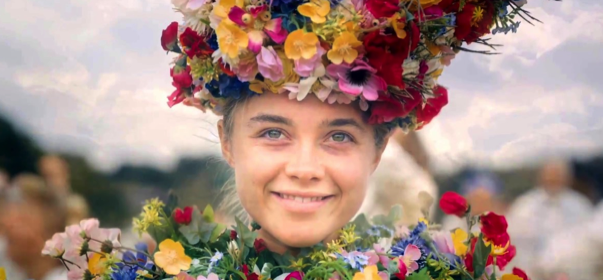


























































































Daymare as Disruption to the System of Things:
The Foreigner and Difference in Midsommar
Robin Wood provides a nice one-sentence definition for horror films: “normality is
threatened by the monster.” Midsommer is definitely this, only the monster is not
something physical—it’s societal structures and the rules/limits they place on their
subjects.
This is immediately implied by the stark cut from the opening montage of trees, snow,
nature, to the harshness of modern society (the film evokes the Western genre in this
way—the tension between civil/wild—also see my blog post on The Revenant and The
H8ful Eight for an example of this point). The film directly establishes the tension between
semiotic and symbolic spaces (the semiotic as tied to nature and the maternal, and the
symbolic as tied to language, “proper” society, and the paternal). Hågra is situated on the
side of nature, harmony of the elements/seasons, and emotion (language disintegrates
into guttural cries of sadness, pain, etc.); the semiotic/maternal. Dani and Christian (and
the Americans) represent the conformity to patriarchal standards that define American
culture.
The film directly confronts the spectator with a problem – the relationship between two
young adults is broken. It’s obvious that Dani and Christian should not be together, yet
they keep playing the ‘role’ of boyfriend/girlfriend because patriarchal society expects
them to (go out, find the love of your life, the American dream, etc.). This is the tension
of the whole movie; patriarchy in crisis. Usually, the goal is to restore “normalcy” to the
narrative (i.e., kill the monster, á la Frankenstien, Dracula, Friday the 13th, etc.). Midsommar
does not.
Hårga also represents difference – a different perspective on relationships, death,
men/women, emotion, etc. The American kids all reject, disrespect, or view the difference
of the commune as something foreign to them. Think of why the majority of them die.
Mark is a stupid bro who disrespects the sacred tree, Josh is consumed by his thesis, and
unconcerned with the fact that he is commodifying these people as a “project” instead of
respecting their ceremony/culture. Christian just wants to leave Dani but is too weak to
express his true emotions, and Dani is too weak to realize she doesn't need a man in her
life for strength. These are ugly people who see the world through their U.S.A.-colored
glasses, and do not change – all except Dani.
Dani has experienced great loss (read: the disruption of American family; no greater
tragedy in horror films), and she is open to the idea of Hårga. She grieves with them,
shares work with them, engages in the dancing ceremony, etc. Hårga as semiotic/
maternal/nature stands in opposition to the American perspective of patriarchy/
consumption heteronormativity. The genius of the movie is, both systems are flawed.
The Hågra adhere to the system of things just like Americans do, but they are
different. Not better, or worse, just different. What’s implied is this: the structure of
societies of all kinds are flawed. There are multiple ways of doing things, and multiple
ways of interpreting the world, death, love, emotion, etc. The American kids all end up
freaking out at the difference they encounter (because Americans are largely selfish,
dichotomous-thinking, elitist, narcissists—how dare you take control of your own death,
what strange customs the Hågra have, that's not how we do things in the U.S.A., etc.),
but not Dani. This is why there is such great joy in seeing her in CU at the end,
surrounded by nature, immersed in the semiotic, as a figure who is now connected to the
maternal through the acceptance of difference into her life. There is the assertion that
societies of all kinds are problematic, so let’s try something new. Let’s invest in a system
that respects difference, and operates from a semiotic/maternal position, rather than a
symbolic/patriarchal one.
Dani’s/woman’s power comes from asserting her own independence and reconnecting
with her maternal/natural space. She accepts the commune, the difference they offer, and
regresses to the semiotic where she finds happiness. Pelle says it to Dani himself at one
point, something to the effect of—“we both come from broken families, the only
difference is, I found a new family in Hårga.” This is what the films says about
contemporary culture. Not that we should come together as Americans (the standard
contemporary bullshit about putting aside difference), but that we should accept
difference into our lives, leading to the true acceptance of otherness.
This film is also an homage to The Shining (1980) in its look, feel, cinematography, sound,
narrative, and critique of culture. The Shining is about a racist, abusive, white, hetero
male who is slowly trying to come to grips with the changes in society that he perceives
as threatening (black/native culture, sexual promiscuity, women, are all threats to him).
This is a common misperception about movements like Black Lives Matter, et. al. It’s not
that black people, women, trans people, etc. want to “take over and surmount”
patriarchal identity; these groups just want equal footing. Jack, and those like him,
misinterpret concepts like feminism as violence against their identities. What's really at
stake is American/patriarchal guilt over its atrocities towards women, minorities, and
other Others, during the transition of the 1960s into the 70s (which, along with the fear
of difference, is the root of most of our problems as a society right now).
posted on 07/16/19 by apw

























































































